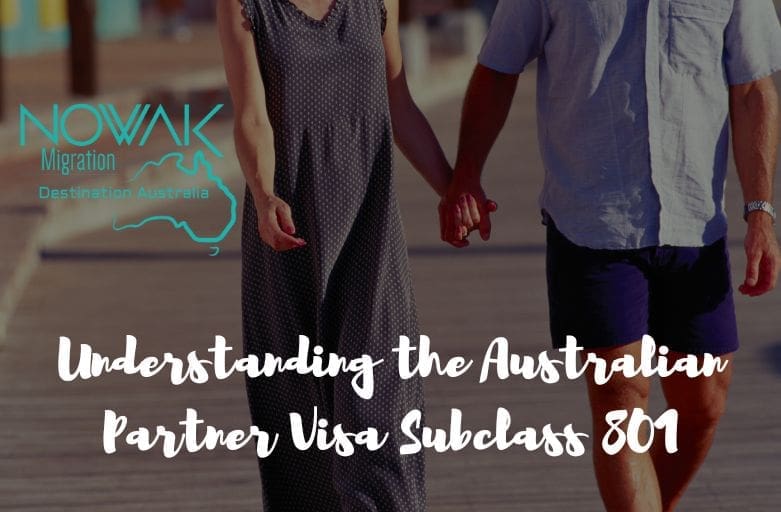Visa 801. Understanding the Australian Partner Visa Subclass 801
Australia, known for its stunning landscapes and vibrant culture, also offers a pathway to permanent residency for individuals in genuine relationships with Australian citizens, permanent residents, or eligible New Zealand citizens. The Australian Partner (Permanent) visa subclass 801 is a key to unlocking this opportunity. In this comprehensive guide, we’ll explore the intricate details of this visa, providing you with a clear understanding of the application process, eligibility criteria, and the benefits of obtaining this coveted visa 801.
Section 1: Understanding the Subclass 801 Visa
The Australian Partner (Permanent) visa subclass 801 is a testament to Australia’s commitment to keeping families together. It allows the partners or spouses of Australian citizens or permanent residents to live in Australia indefinitely. To comprehend this visa fully, let’s break down its key components.
Eligibility Criteria
To be eligible for the subclass 801 visa, applicants must meet specific criteria. This includes being in a genuine and continuing relationship with their Australian partner. The applicant should have already applied for and most of the time been granted a temporary Partner visa (subclass 820). Understanding these criteria is crucial before embarking on the application journey.
Section 2: Visa 801 Application Process
Navigating the Australian immigration system can be complex, but with the right guidance, the process becomes more manageable. Let’s delve into the step-by-step procedure of applying for the subclass 801 visa.
Navigating the Online Portal: A Step-by-Step Guide
Document Compilation: Building a Strong Case
One of the crucial aspects of a successful subclass 801 visa application is providing comprehensive and compelling evidence of the relationship. This evidence serves as the cornerstone of the application, offering the immigration authorities a glimpse into the genuine nature of the partnership. Documents may include joint financial records, shared utility bills, correspondence, travel itineraries, photographs, and affidavits from friends and family affirming the authenticity of the relationship. Each piece of evidence paints a picture of shared life, responsibilities, and experiences, reinforcing the bond between the partners.
Statutory Declarations and Affidavits: Testimonials of Love
Statutory declarations, also known as affidavits, play a significant role in the application process. These sworn statements, provided by the applicant, partner, and acquaintances, offer detailed accounts of the relationship. They encompass the story of how the partners met, their shared experiences, and future plans together. Well-crafted statutory declarations can add a deeply personal touch to the application, humanizing the relationship in the eyes of the immigration officers. Please remember as a bare minimum it is paramount to provide at least 2 statutory declarations from friends and family on form 888 and statutory declaration about the relationship from the sponsor.
Financial Documents: Demonstrating Commitment
Financial stability is a key element in proving the genuineness of a relationship. Joint bank accounts, shared loans, and evidence of financial support are vital. Applicants should provide comprehensive financial documents that clearly outline the partners’ shared economic life, showcasing their commitment to each other’s well-being and future.
Legal and Identity Documents: Establishing Legitimacy
In addition to relationship-specific evidence, applicants must include legal documents to establish their identity and legitimacy. This includes birth certificates, passports, marriage certificates (if applicable), divorce decrees (if previously married), and police clearances from all countries resided in for more than 12 months. These documents verify the applicant’s identity and help establish the legality of the relationship.
Professional Guidance: Navigating Complexities
Given the intricacies of the application process, many applicants seek the assistance of registered migration agents such as Nowak Migration. These professionals possess in-depth knowledge of immigration laws and can guide applicants through the process. From document compilation to form submission, their expertise can significantly enhance the application’s chances of success.
Section 3: Benefits of Subclass 801 Visa
Obtaining the subclass 801 visa offers a plethora of benefits, transforming the lives of the applicants and their families. Let’s explore these advantages in detail.
- Permanent Residency: Once granted, the subclass 801 visa confers permanent residency upon the applicant. This means they can live and work in Australia indefinitely, enjoying almost the same rights and privileges as Australian citizens.
- Access to Healthcare: Visa holders are eligible to enroll in Medicare, Australia’s national healthcare system, ensuring access to quality medical services. Actually once an applicant would apply for 820/801 they’d be eligible to enroll in Medicare.
- Work and Study Opportunities: With permanent residency, individuals can work and study in Australia without restrictions. This opens up various career and educational avenues.
- Pathway to Citizenship: After meeting the residency requirements, subclass 801 visa holders can apply for Australian citizenship. This grants them the right to vote and participate fully in Australian society.
Section 4: Visa 801 Challenges and Considerations
While the subclass 801 visa offers numerous advantages, applicants should also be aware of potential challenges. These might include the complexity of the application process, meeting financial requirements, and providing sufficient evidence of the relationship’s authenticity. Additionally, keeping up to date with changes in immigration policies and regulations is essential to a successful application.
Section 5: Applying for Subclass 801 Visa after the Relationship Ends
Family Violence and Children: Exceptional Circumstances
In the unfortunate scenario where a relationship with the sponsor no longer exists, applicants might still be eligible for the subclass 801 visa under exceptional circumstances. The Australian government, in recognition of the vulnerable situation of individuals, has put in place specific provisions to safeguard the rights and well-being of applicants, particularly in cases involving family violence or the presence of a child from the relationship.
Family Violence as Grounds for Visa 801
Consideration
Family violence is a grave concern and is taken very seriously by Australian immigration authorities. If an applicant has experienced family violence during the relationship, it is recognized as an exceptional circumstance. Family violence includes any form of physical, sexual, emotional, or psychological abuse. In such cases, applicants are encouraged to report the incidents to the authorities and seek support from relevant organizations. Immigration officers are trained to handle such cases with sensitivity and empathy, ensuring that victims are not penalized for the actions of their sponsors.
Children from the Relationship: A Protective Measure
The presence of a child resulting from the relationship further complicates the situation. Australian immigration policies are designed to prioritize the welfare of children. If there is a child from the relationship, the applicant’s eligibility for the subclass 801 visa is assessed with great care. The government recognizes the importance of maintaining stable environments for children and ensuring their access to proper care, education, and support.
Support and Advocacy for Vulnerable Applicants
Applicants facing family violence or dealing with the complexities of child custody are strongly encouraged to seek support from local organizations, social services, or legal professionals specializing in family law and immigration matters. These support networks can provide invaluable assistance, guiding applicants through the process, offering emotional support, and ensuring that their rights are protected throughout the visa 801 application process.
Documentation and Evidence: Building a Strong Case
In cases involving family violence or children from the relationship, providing comprehensive and well-documented evidence is crucial. Affidavits from support organizations, legal professionals, or counselors can strengthen the case. Additionally, medical records, police reports, court orders, and statements from friends or family members who are aware of the situation can serve as vital pieces of evidence. The more detailed and thorough the evidence, the stronger the case for the applicant’s eligibility for the subclass 801 visa under these exceptional circumstances. Nowak Migration has successfully handled cases involving family violence or children from relationship. If you require assistance, please do not hesitate to contact us for a confidential discussion about your situation.
Note: Applicants facing family violence or dealing with child custody issues should seek professional legal advice and support from local organizations specializing in domestic violence and family law. The Australian immigration authorities prioritize the safety and well-being of vulnerable applicants, and there are support networks in place to assist individuals in these challenging situations.
Conclusion
Obtaining the Australian Partner (Permanent) visa subclass 801 is a significant milestone in the lives of couples wanting to build a future together in Australia. By understanding the eligibility criteria, navigating the application process, and being aware of the benefits and challenges, applicants can approach this journey with confidence.
This guide has provided a comprehensive overview of the subclass 801 visa, but there is much more to explore. As you embark on this journey, consider seeking professional advice to ensure a smooth and successful application process. Remember, every step taken brings you closer to the opportunity of a lifetime – the chance to call Australia your permanent home.


